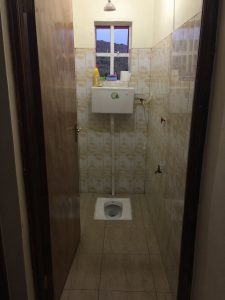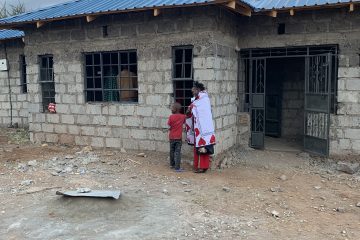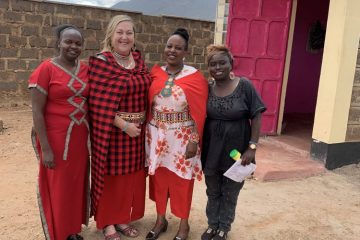It’s my second day at school and the first day of real working. I have set myself a fairly large challenge. I want to observe two class lessons from each teacher, hold 1-1 teacher meetings and provide written feedback to be used as a baseline evaluation. This translates to 18 observations, 9 individual meetings and 9 written reports. I have said that I will aim to complete this work in two and a half days. It’s a lot to do but it is the best way for me to assess the strengths and areas of development for the school and teachers.
Teachers are usually in school by 7.30am so I feel that I must try to do the same. This wouldn’t usually be a problem but my body clock is on UK time which means I will have to be in school for 4.30am! I set an alarm.
My first challenge is negotiating the shower. Firstly, I am delighted to have one at all and I’m not bothered about it being cold water. The spray nozzle extends from the wall and water just runs on to the floor – a bit like a wet room. Of course, there is also a ‘long drop” on the floor, which is the toilet. Some careful negotiation is required. One wrong move and I’ve got a foot down the long drop!

Mission accomplished, I make my trusty flask of coffee to keep me going during the day. My schedule is so full that I will not really have time for porridge break or tea break. I have built in 15 minutes for lunch. I’m going to need the caffeine.
I see some good lessons and some not so good lessons. But the great news is that I see areas of good practice in every single classroom and in every single teacher. Children are well-behaved and attentive. Relationships between teachers and pupils are very positive, warm and full of respect on both sides. All of the teachers that I speak to are committed and genuinely keen to improve their skills and their practice. It is evident that there is both capacity and an appetite for improvement and it is really exciting to consider what might be achieved at Osiligi Obaya.
I have challenged the children, at my opening Assembly, to ask me questions about Scotland and in every class I visit, I give them the opportunity to do so. The children are curious and have clearly thought about it. The range is astonishing:
Why does it snow in Scotland?
Why is your hair not braided?
What is the capital?
Who is the President?
Do they have medicine trees in Scotland?
Why is the population so small?
What crops do they grow?
Why is it hot and dry in Kenya and cold and wet in Scotland?
In Class 6, one pupil puts her hand up. “Do they have HIV /AIDS in Scotland?” she asks. This is an astonishing question and great to hear. It means that the work the school are doing is helping to lift the stigma and that it is now a subject that can be talked about. I explain that every country in the world has people with HIV. She asks if Scottish people die from AIDS. I say that this doesn’t happen anymore because of the medicine available. She continues, “Why do people in Kenya have no medicine?” (Actually, the medicine is technically free in Kenya but in many cases, clinics charge patients anyway.) I said that it was because of money. She shrugged her shoulders. “It is hard to live in a poor country.” In discussions later, I was told that she may be HIV positive or have a family member who is infected. However, there is still a stigma attached so there is great opposition to testing in the local community. She is 12 years old. I had to take a few moments. It was absolutely heart breaking. It was a timely reminder of why I am doing this.




1 Comment
Elaine McGowan · 17th March 2018 at 9:25 am
Out of the mouths of babes indeed! Why should your life and death chances still depend on the luck of the draw of where you are born?